:quality(80)/business-review.eu/wp-content/uploads/2018/09/NEAN1672.jpg)
Startup PATH is an event dedicated to growth, to learning and to connecting the dots while having unique experiences. It brings together all actors of the startup scene, from universities, accelerators, to investors and thought leaders that would help entrepreneurs on their path to growth.
Here are the main statements from Day 1.
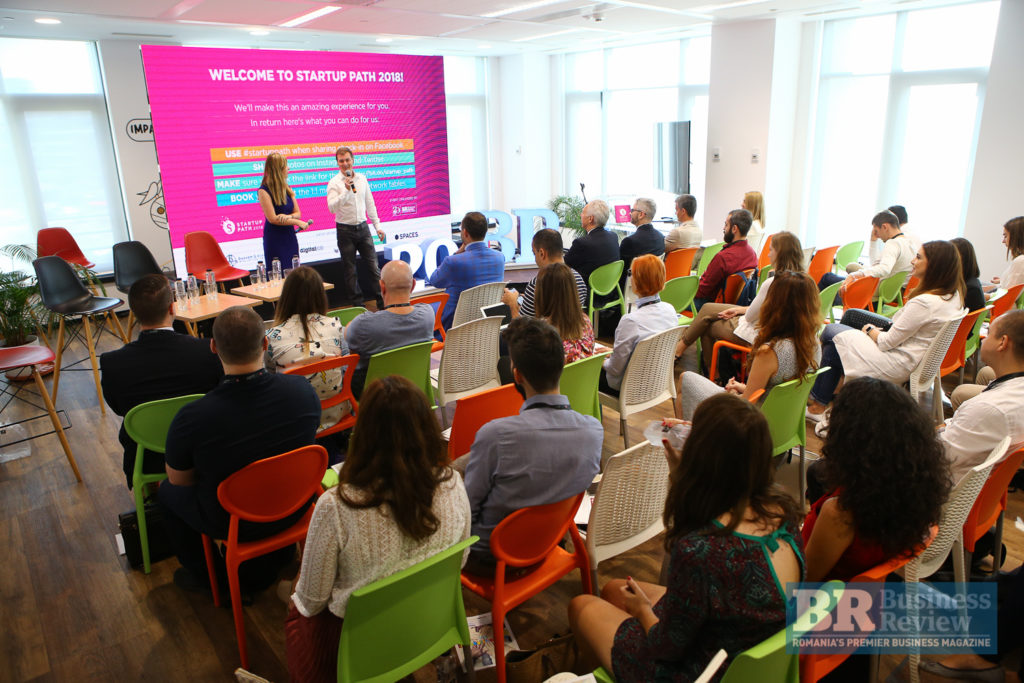
US Ambassador Hans Klemm: “What’s you’re doing is to support entrepreneurship and develop the ecosystem that supports start-ups (…) and show the value of entrepreneurship which is the success of the US and the economy,” he explained.
Incubators, universities, advisors, networks, and funding organizations are part of the ecosystem, he explained.
“In the US, in places like Silicon Valley, Boston, New York and there are other places that became successful because they helped entrepreneurs,” he explained.
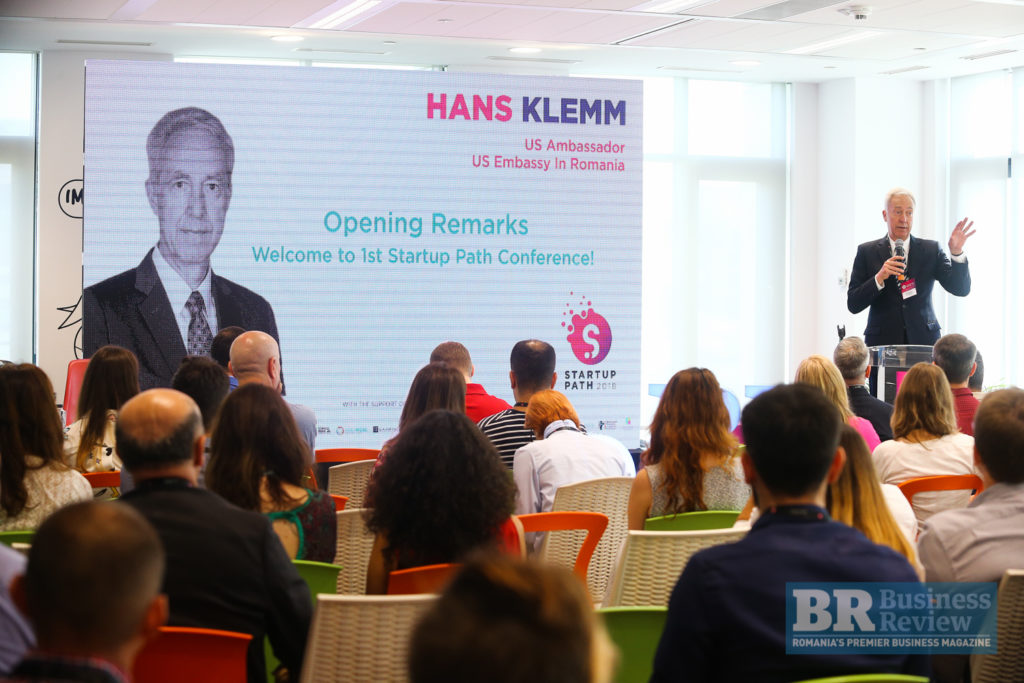
Improving Romania’s start-ups. He said that transfer of technology, the culture of taking risks and education are key for improving the local entrepreneurship scene. Romania’s entrepreneurship culture should promote serial entrepreneurship and using failure as a step to success.
He said the the US brought US entrepreneurs to Romania to help on the legal framework that supports entrepreneurship.
Scaling-up remains difficult. (…) It needs an attractive business environment. Certain provisions can create burdens for entrepreneurs and businesses.
He cited public sector integrity, quality of public sector and infrastructure as some of the factors that help the private sector and smaller companies.
“The US Embassy strongly supports entrepreneurship as part of the partnership with Romania. (…) Entrepreneurs are the driving force of our economy and of many economies,” he said.
He mentioned the The Romanian American foundation – one of the partners of US Embassy in Romania on promoting entrepreneurship alongside AmCham. He also cited Alianta members that came to Romania to promote the entrepreneurial ecosystem.
“The US government has been a sponsor of the Global Entrepreneurship Forum,” said the ambassador.
Ionut Georgescu – CEO | FWEI & PARTNER | BUSINESS REVIEW
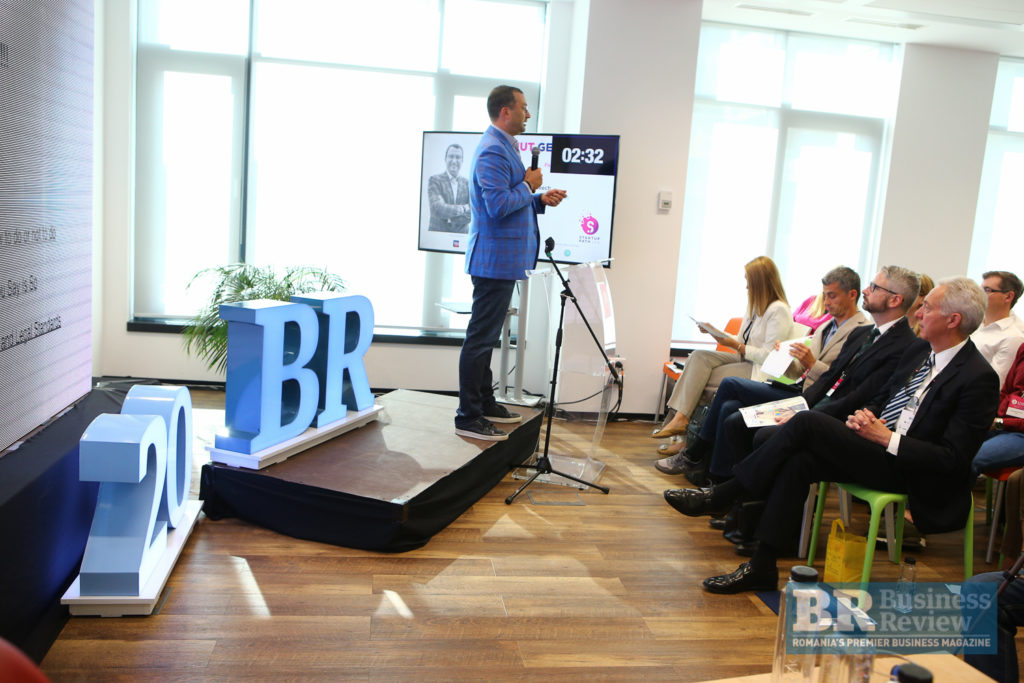
- Our commitment is to empower Romanian entrepreneurs go global. After my experience in Silicon Valley I think that the transformation we have to go through is to see the world differently. It is possible to transform yourself. To pass, to move forward and see the world with different eyes.
- Together with partners, such as Y Combinator, we’ve tried to learn how come Silicon Valley has this many entrepreneurs. We want to make Romania as special as Silicon Valley. Believe in the future of his/her idea and creating and making long-term commitments. It s important to live your life among people who are positive and take you and your idea seriously.
- Failing. I ask myself: why do they love failing in Silicon Valley?In Romania, in high school, we were taught that failure must be punished. When I went to school with my 13-year-old, who is enrolled in the 7th grade, we were told that each test will be taken twice. The explanation was that We were taught not to fail, not to make mistakes. They teach children that failing is good if you’ve learnt something from it.
- Building a great company in the US is about building a good team first. If the members have a long-term commitment you don’t care about the skills, because you can learn that in the process. You can’t invent passion.
- To be humble is the most honourable capacity of a human being. Regardless of whether you win a million dollars or you lose, you must stay humble. Also, you must move forward. When you think I’ve lost money, I need to become employed and earn money and then return to entrepreneurship … you are wrong. A good investor will say that even you lost money
- Everything must be built on four pillars: integrity, entrepreneurship, education and government.
- We can shape Romania, we can influence the government. But everything should be built with integrity.
- As an entrepreneur, you won’t be able to deliver what you said you would every time. How many times have you heard Elon Musk say I’ll deliver something next month?This is something that is expected from you. It is very important, when you say something, a commitment or a statement it should be like that. Sometimes, when you are a leader, you should not give arguments. The ultimate argument is “I am the leader, and I say so.” And people will follow you if you act with integrity.
- If you have small startups, it can be more difficult to find resources. But you need at least someone in your startup team to be your chief evangelist. If you send someone You also must be an optimist and not lose momentum. If you are not ashamed of you in the first day of your product launch, then you have launched it too late. Go fast because you will learn a lot from that launch. Transform our constraints. When you have a nice life with a system that is working, sometimes you do not feel the passion to go be an entrepreneur and start something new. Being an entrepreneur means working, working, working. And make sure you keep things sismple. If it’s too complicated for a 10 year-old to understand, change something.
- Everything about what we do is about language. Our goal at Business Review is to build a common language for Romanian entrepreneurs. We need to create a new context and do not bring past experiences in the equation. You will see the world differently.
- If you want to build something bigger than yourself you must do that with gratitude. To thank everyone, even to those who tell you something is wrong.
- You need around you people who support you because it will be difficult. You will have breakdowns, because even big boys cry.
- I failed twice, I went nearly bankrupt. Now I have 160 colleagues and a total turnover of EUR 40 million. Since 2017 I rediscovered myself and I am still doing this and I am committed to change the Romanian entrepreneurship scene. I have a dream, to have a better Romania.
Panel discussion | Fostering entrepreneurship community growth
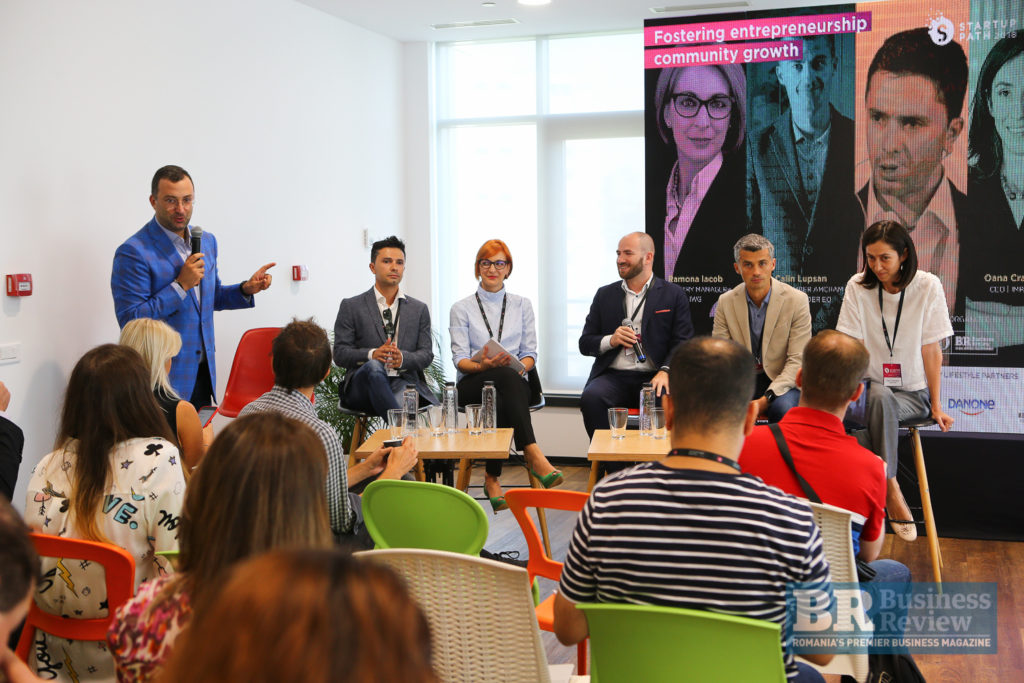
Oana Craioveanu, CEO, Impact Hub
“Going in the 7th year of Impact Hub, it’s a very vibrant entrepreneurial ecosystem,” she said.
“Most of the Romanians entrepreneurs are extremely open-minded in getting support. We should articulate more what we are missing.”
“The trust is the key element that makes you join a community and makes you start to offer.”
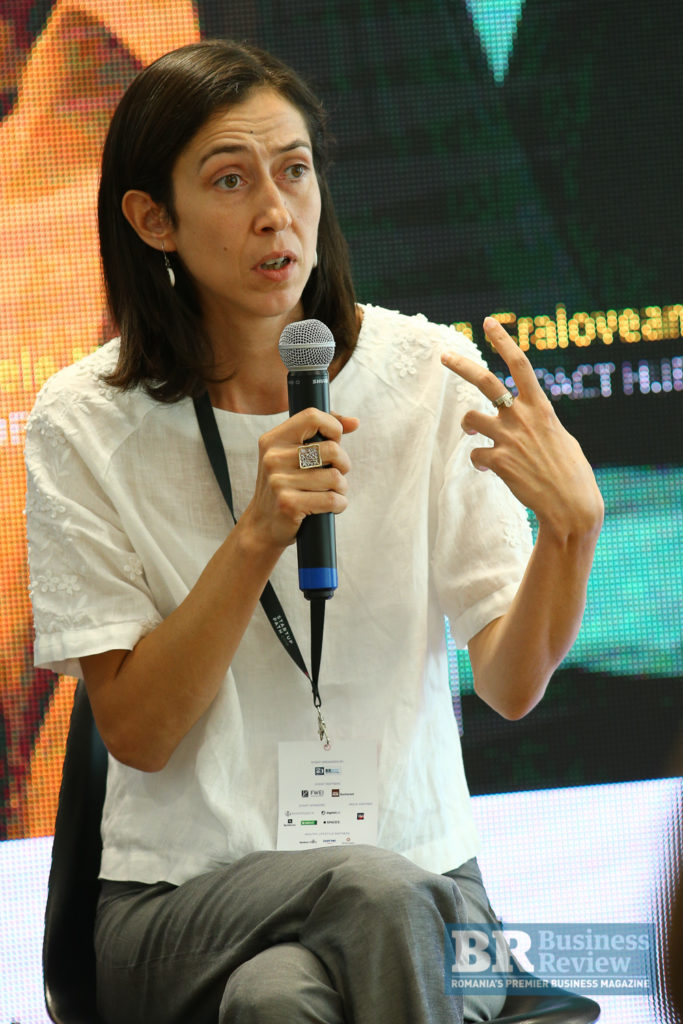 Craioveanu said that for communities to grow, its members have to be ready to give more.
Craioveanu said that for communities to grow, its members have to be ready to give more.
“In early stages, Romanian entrepreneurs are more open to listening to advice,” said Craioveanu. She added that in more advanced stages, it’s about more “effective collaboration.”
“As for more established entrepreneurs, it’s interesting to notice that the big Romanian entrepreneurs are starting to open up,” she said.
“It does matter where are you in the entrepreneurship story – in the beginning, starting to get customer or in the mature stage.”
“The incubation and accelerators present in Romania are private initiatives,” said Craioveanu, adding that there should be more collaboration with universities.
“Corporations are starting to realize the extend to which start-ups can disrupt them.”
“You need to be very clear on the business model.”
“In Romania, under 1 percent of companies are getting funding through investments.”
Ramona Predescu, country manager, IWG
“The core of our business is building communities,” she said.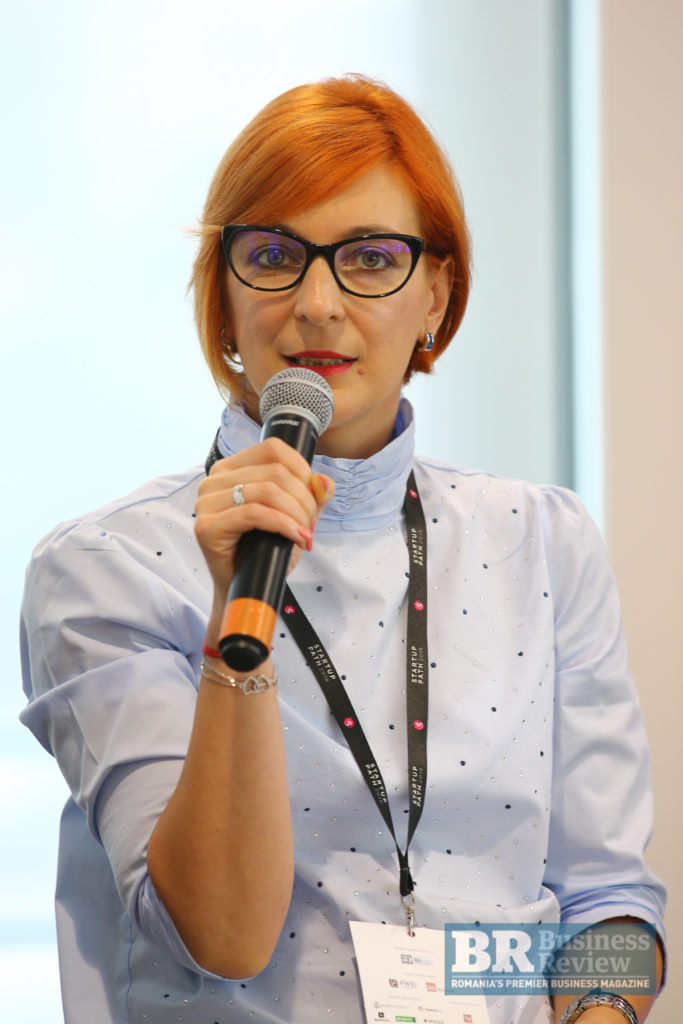
“At Spaces it’s basically like feeling at home. We try to bring this flavor inside our Spaces as well.”
“The community is about events, but also about the workspaces,” she explained.
“We are taking space of the working spaces, the meeting rooms,”said Predescu, on how the company helps entrepreneurs.
“In Europe, the US, people are crying for help and are open to each other and it’s easy to grab ideas,” she explained on the need of entrepreneurs to be more open-minded.
Calin Lupsan, board member, AmCham & Co-founder EO
The Entrepreneurs’ Organization has the ingredient of trust in it.
“There are a lot of obstacles when doing a business. (…) The art of overcoming obstacles is a key skill in being an entrepreneur,” said Lupsan.
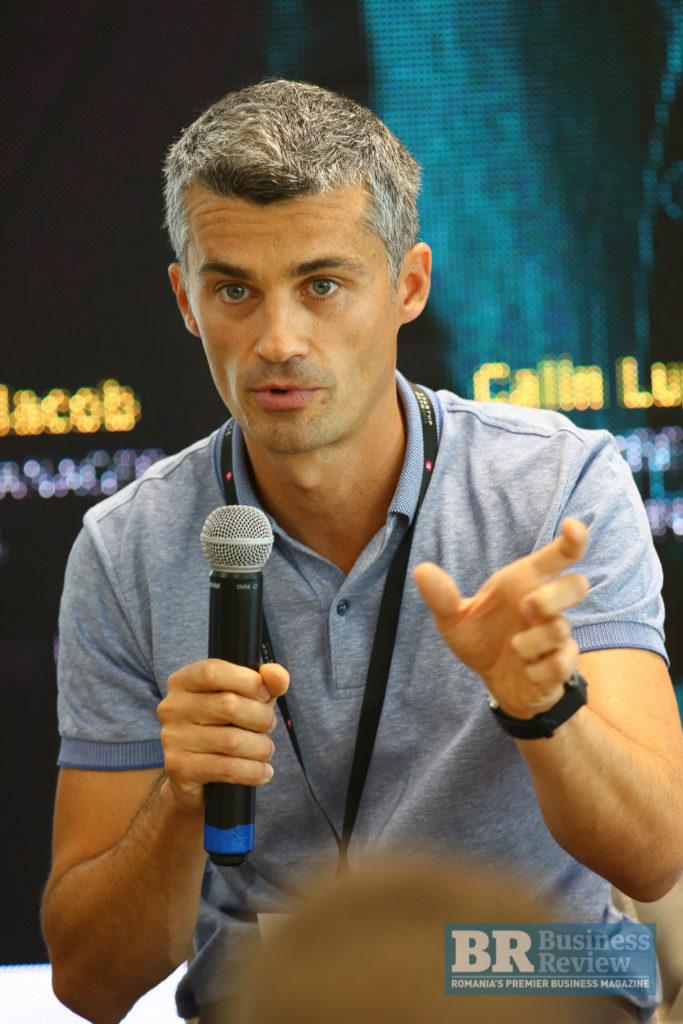 “The key idea is how to make sure you’re strategy is good.” He added that a community can help an entrepreneur reach faster a working strategy.
“The key idea is how to make sure you’re strategy is good.” He added that a community can help an entrepreneur reach faster a working strategy.
“As an entrepreneur you need to take huge action in order to succeed”
“Most of entrepreneurs struggle, it takes many years to reach a point when you say you are a successful entrepreneur,” said Lupsan, adding that the enthusiasm, the hunger and the mission are part of the mindset for achieving success as an entrepreneur.
Daniel Rosner, program manager, Innovation Labs Romania & UPB Lecturer
“A diverse community will help you go a long way.”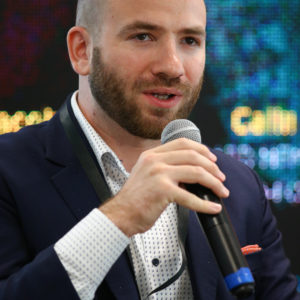
“At Innovation Labs we like to bring young entrepreneurs with universities.” He added that companies are also included here.
“We don’t have investment funds for 100K and this could help grow the Romanian ecosystem,” he said.
Emanuele Musa, co-founder, Babele & NOD MakerSpace:
The co-working spaces are best for start-ups, he said.
For Romania, it would be great to see more corporations that can organize events in order to get in touch with start-ups, said Musa.
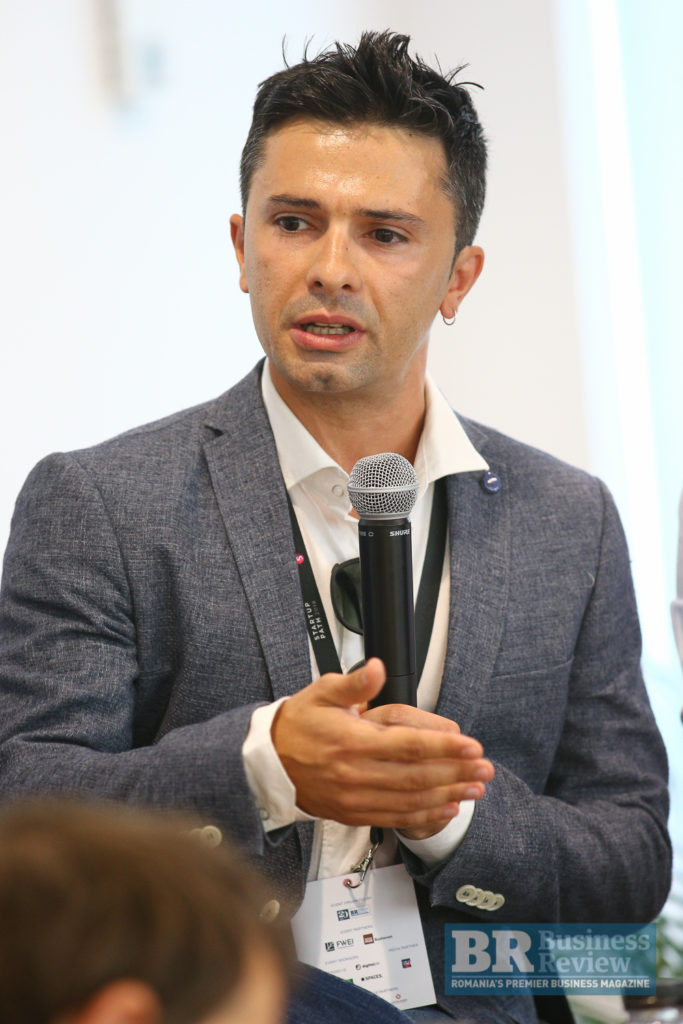
“There has been a major movement to help entrepreneurs open up”
“We should have more exercise to think more agile, more lean” he said on the process on validating products.
“We need more accelerators – it’s a good way to get feedback more advisers, from investors,” said Musa. He cited the experience of Startup Chile in which the country hosts entrepreneurs from across the world and get them in touch with local entrepreneurs.
“Crowdfunding is fundamental.”
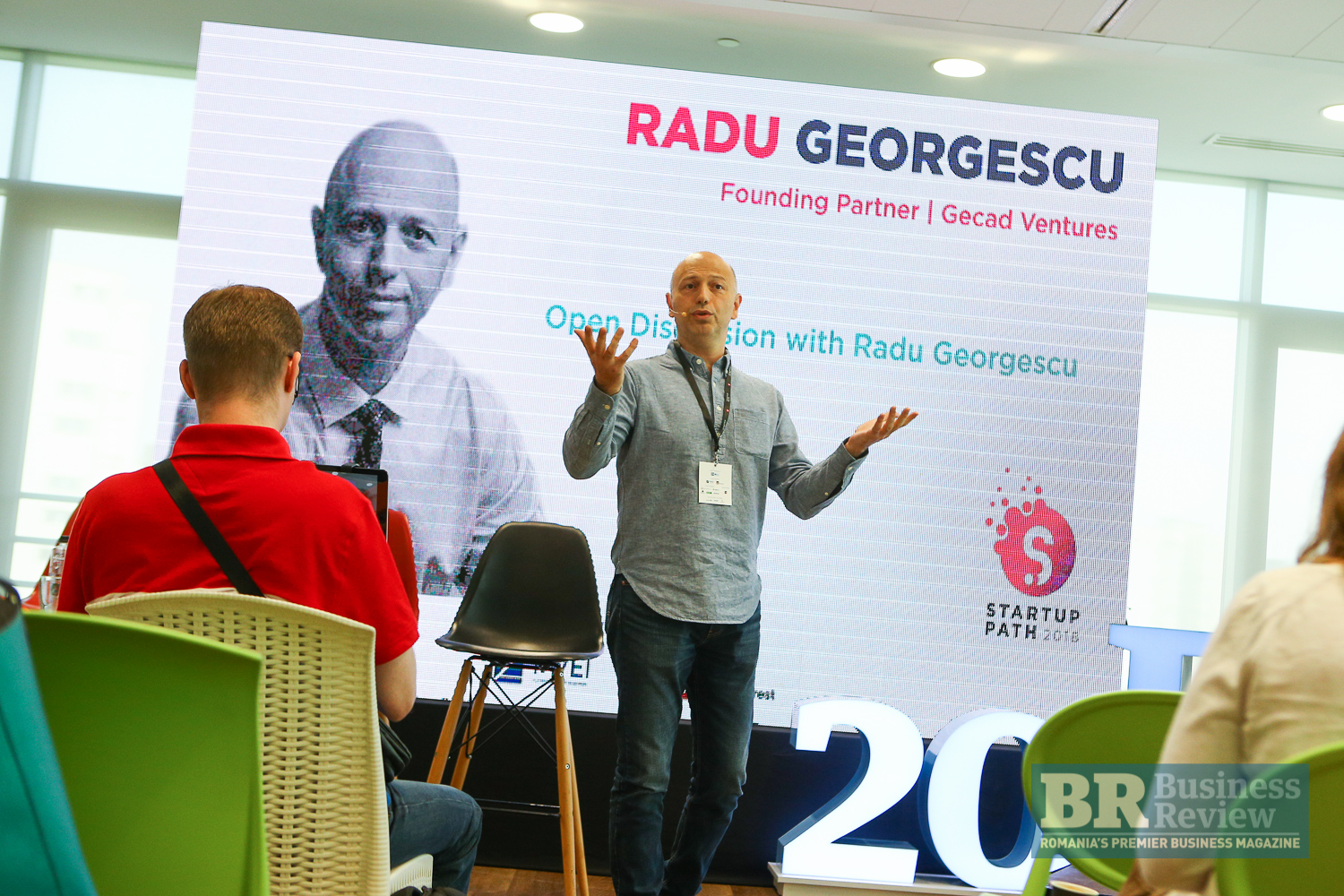
Q&A session with Radu Georgescu – Founding Partner GECAD PARTNERS
Q: What should a small business owner do after his/her first failure?
A: Fail again. Failure is the greatest thing there is. You do not learn anything out of a success. It’s very easy to say ‘success doesn’t matter and failure is good’ but I think everyone owe himself and herself an experience of failure. Hopefully, your first failure is a bit of a success so it can fund your next success.
Q: What was your biggest failure and how did you get out of it?
A: Yesterday’s are still a little bit painful so I’ll talk about the. Norton Commander was a file manager, something like Windows file explorer. We thought Norton Commander costed USD 20 and if we create a copycat in 1995 we’re going to make some money. But then Microsoft 1995 appeared and Microsoft Commander become redundant, and so did a copycat of it.
Q: What would Radu of today say to Radu of 20 years ago?
A: Being in that position, I would do the same thing. I am a lucky guy because I don’t want to change anything. At that point I was younger,energetic and thought that as long as you get a little bit of money will go a long way. But I am ashamed a bit to say that I got a little money and I really thought that it was going to last forever. This is something that changed for me.
Q: As a business angel, what do you look for when investing?
A: Vision, ability to execute and chemistry. This means we share the same values. Vision is important. They need to answer the question ‘why.’ But then, the most important thing is the ability to execute. All big companies in the world are not those that had the idea, or the vision. They are those who executed brilliantly. Yes, there needs to be chemistry as well.
Q: How do you see the startup ecosystem and your advice for young entrepreneurs?
A: I believe an entrepreneur is someone who thinks things in a certain way. But I would go for global companies. I wouldn’t do a company for my neighbourhood, not my city but for the world.
Q: Why should I sacrifice and become an entrepreneur?
A: If you ask this question you shouldn’t be an entrepreneur. the worst thing is to be something you don’t want to be. You feel strangled and have to do things that you don’t want to do. To be an entrepreneur and to want the safety of a pay check at the end of the month are not compatible. If someone is asking themselves why should I do the sacrifice to become an entrepreneur they should not do it.
Q: How can someone start something with passion when there are costs of living?
A: I have two steps of the process. The first – you have to transform your passion into a business. Am I going to do X or Y?You should start with your passion. You can go for 8 hours to a job and pay your bills and another 8 hours to follow your passion. There are 24 hours in a day. You go to school for 8 hours, because you need that. Then you have 8 for your job and the rest of 8 for your passion. Yeah, life sucks.
Q: What is an entrepreneur?
A: A problem-solver. Has or gets a vision and knows how to solve the problem.
Q: You had so many opportunities to leave the country. Why didn’t you go?
A: I didn’t go to the States. Good logistics, very clever people and very good business are there. But I love being here. My advantage is that I can travel and I spend 5 months in the Bay Area. So I’m taking the best out of both world.
Q: What is your mission in life?
A: I asked myself that 10 years ago and pondered about what I’d like to be written on my tombstone. I gave myself an answer and didn’t like it. But then I came to terms with it. It does sound egoistic but I believe it implies a lot of good things around me. I want to be happy and everything I do is in order to be happy. One pillar is health, then there is family and then profession. And all this are based on a very big and solid foundation of values that I need to carry.
Q: I am one of those people following his passion. How were you perceived when you start following your path?
A: I thin at that time, back in 1992, entrepreneurship was not even a word. I started a company and I was seen perhaps as a maverick. My wife, who was a doctor, was making money and we got a computer and we were making some money out of it. But people trusted me and I am grateful for that and it was a great time.
Q: You are successful now. But what is your biggest fear?
A: My fears are more related to what’s happening tomorrow. I have fears about getting to my next meeting. I have fears that I am not as big of a thinker as your question suggests.
Q: How do you bring well-being?The hard work phase … how long should it last so that it doesn’t take a toll on your personal life?
A: I think that each of us has a time that says how much he or she can take. Someone should not start with pressure because you might fail. Overlapping the two is the way to do it. And if you’re in the corporate world you should do both until you’re decently sure you can do it.
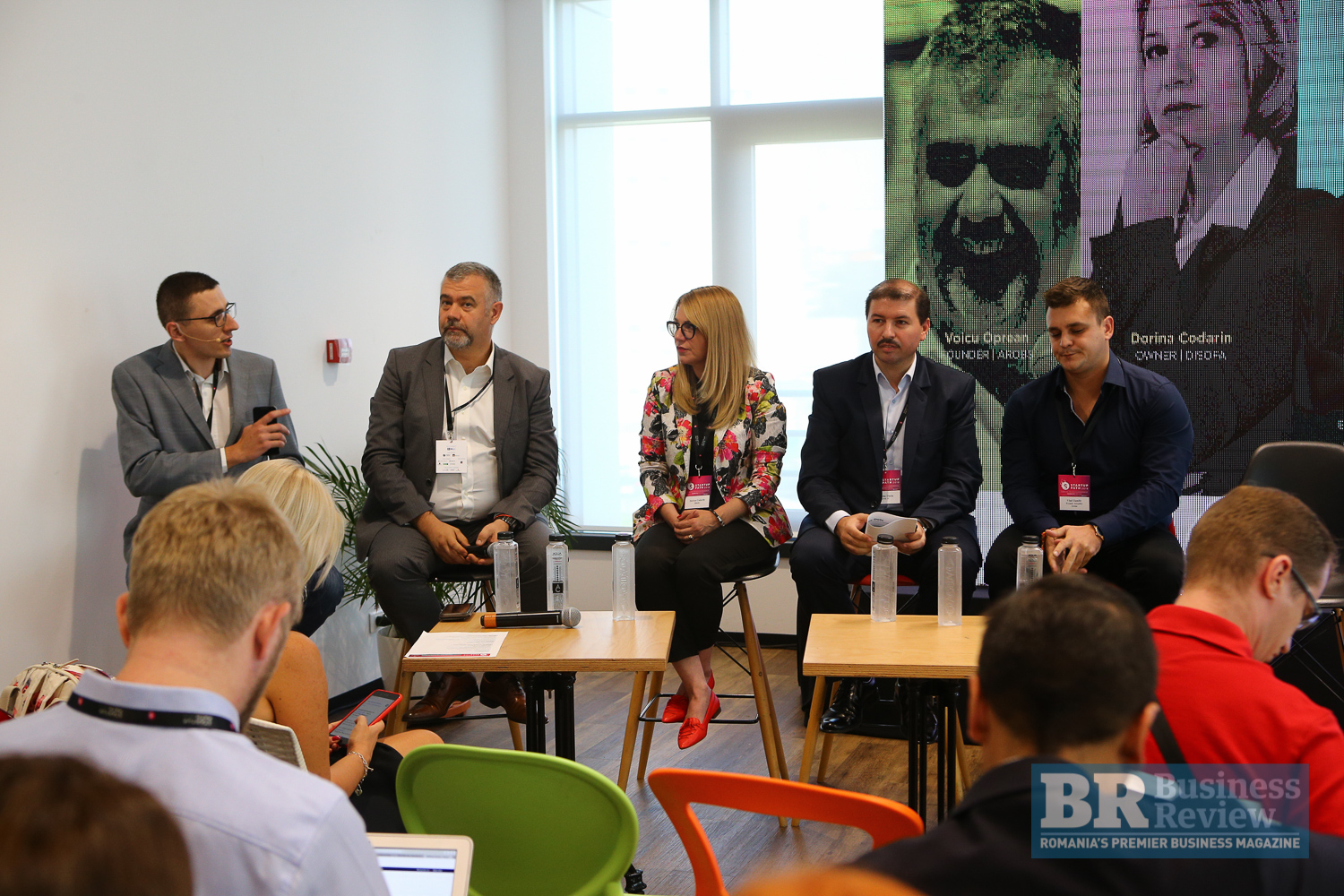
#MakeItHappen Panel
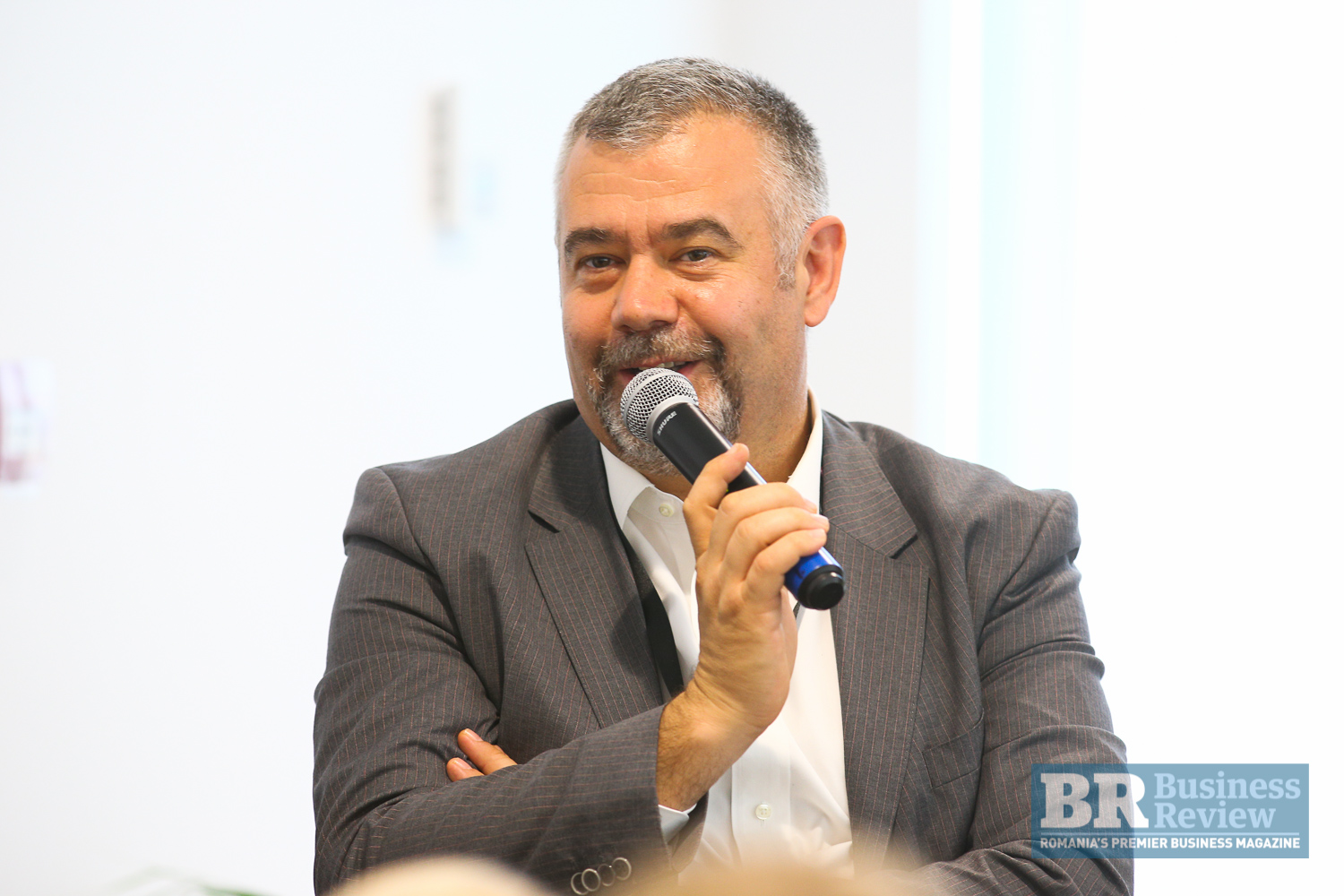
Voicu Oprean – FOUNDER | AROBS
I brought the company in a place where I didn’t think it would go. I am a venture investor in some start-ups. I worked in a company for three years then I started an MBA and that allowed me to apply for Work and Travel to the US. We are doing a lot of acquisition. We will pay in installments, which means in three years we will pay everything. We are also testing a different business model. With our existing solutions we are capitalising on the fields of education and TMS. It was a mix of opportunities and a calculated risk. I don’t know much about the Bucharest startup market, but I am here to learn. The recipe – there isn’t one. As every chef is making his or her own recipe, I recommend everyone to try. No one taught me how to make an acquisition abroad. I learned step by step. Best decision I ever made was to work in teams. That is a key thing. There is a stereotype that says ‘hire better people than you’ but that’s true.In order to build a community you need to tell people that anything is possible. Now there is more money, there is an ecosystem and , what is missing is people. Just do it, you don’t have to sacrifice that much. I’ve heard of many people who
I am not a serial entrepreneur. I am more in the sustainable business. My plan is to consolidate. And to go further.
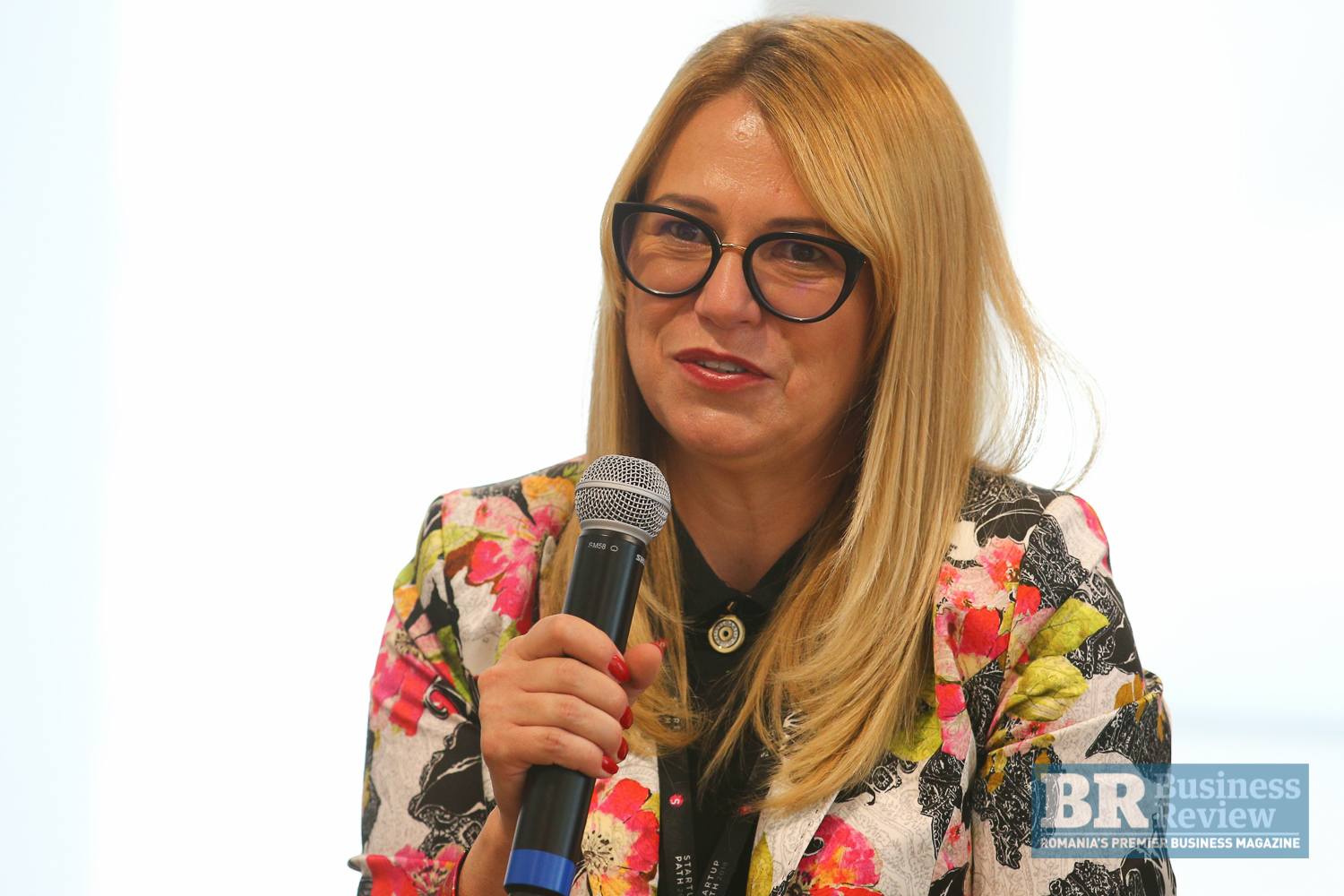
Dorina Codarin – OWNER | DISOFA
Disofa is a family business. We are producing upholstered furniture and are planning to go abroad with our business. We started the company with my husband that was selling furniture made by other producers. And then realised my passion was in this field – and I believe you cannot do anything without passion – and last year we decided to start a company making furniture.The most important thing is to find the courage to do whatever you do every single day. The best decision I ever made was to comment on the link posted by Business Review because that has brought me a lot of networking opportunities. I think in Brasov the business community is a little closed. That is why I always come to Bucharest to attend such events. It seems that Romania is on the right track finally. Romania is better at talking about entrepreneurship. In order to do that, you need to sacrifice a lot to do that.
Our main objective is to have EUR 3 million revenue. Starting from next year we want to sell abroad, to the UK and northern Europe.
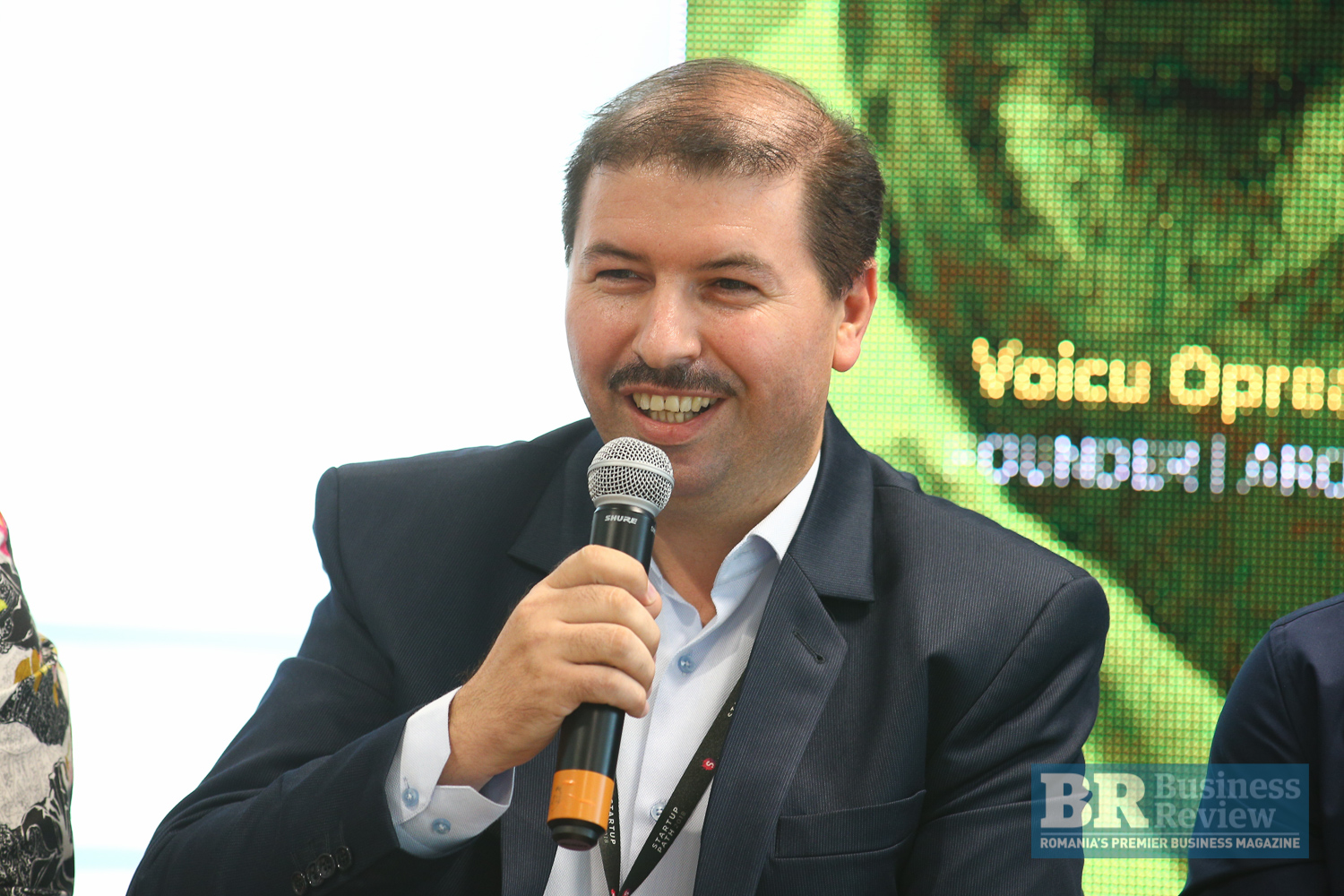
Nicolae Ontiu – FOUNDER | ONE IT
We are headquartered in Baia Mare and early this year have launched a new department where we provided Augmented Reality (AR) solutions. at the end of the week we have an exhibition in the US and we will promote our products. My company was not started in a garage, but in a flat. From this passion I took – and in a serious way was that services should be built on quality. That is why our customers from northern Romania trust us and they do more with our solutions in IT. About AR – we have a lot of customers in a lot of business areas. And we discover that they have an issue about maintenance and assistance. That is why we provided some pilot customers with our beta products and the feedback was positive. That is why we now have a department and cater to the entire world. We now have US customers and from the UAE. Most customers and in the petrol and gas sector.It is important to grow a business and I have four main points.
The first was crucial – motivation. You must have motivation and passion and that will guide you. If you want to start a business, then you must have a business plan with what you want to achieve, to show where you want to go. And in this business plan you must have objectives that you must achieve with your team. Third, it is important to be focused. You must invest energy in what you want. Last, you must be patient. Success doesn’t happen overnight. You will need time to grow. It doesn’t happen instantly.
My best decisions as not to work by myself.And I had to learn to delegate to my team. Also, it is important to grow your team and give power to your team, which will take you forward.
At the end of the week we’re starting to promote abroad and three years; time we want to be in four international markets.
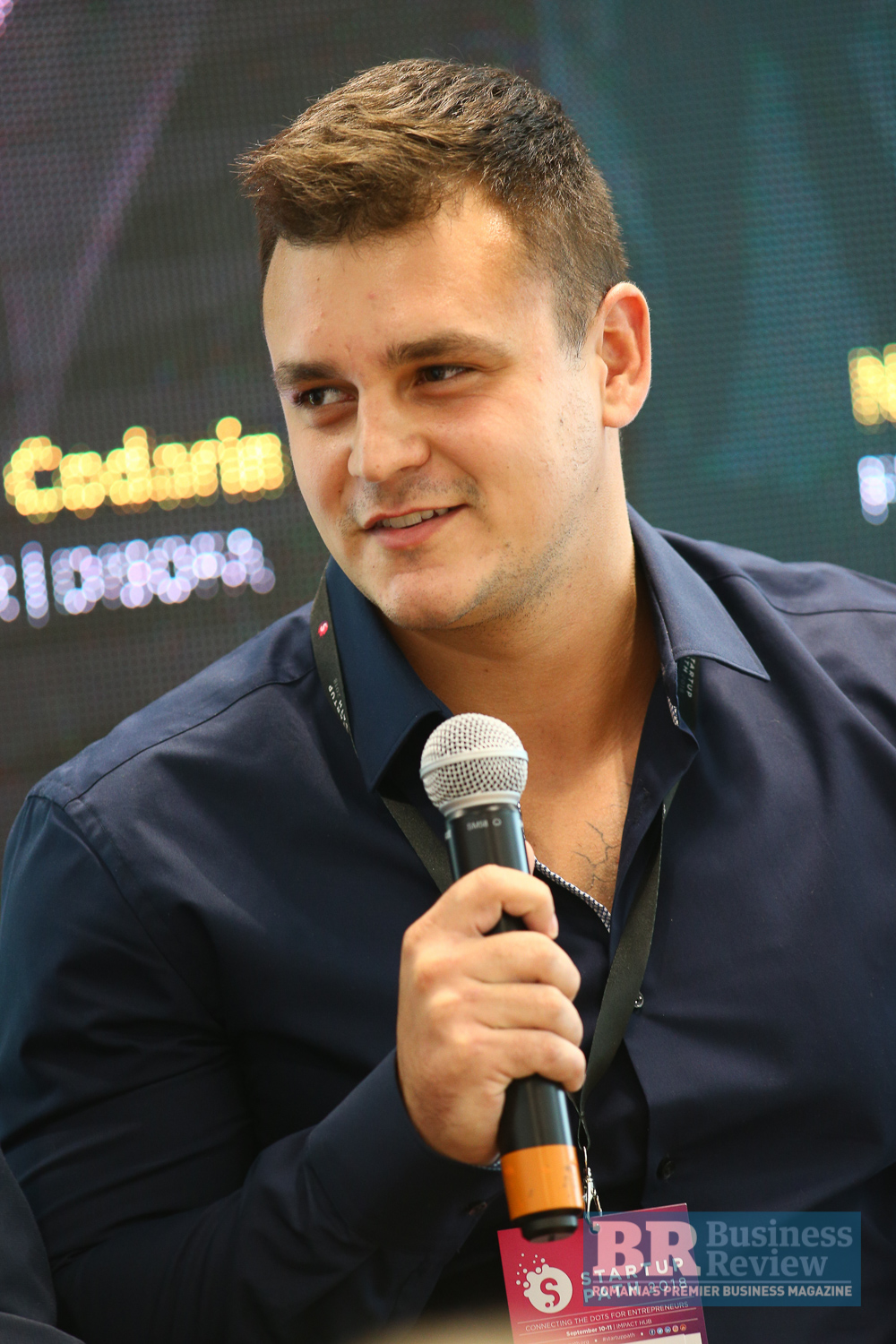
Vlad Zamfir – FOUNDER | FYSNOW AIRSOFTCS ARENA
I own a business that allows you to play airsoft and have created a map based on Counter Strike. Failures are most important things in your businesses when you know what do do with them. I like to live free and do things for me and for the rest of people. I believe this is my way. In my vision there is no special secret. You must start tomorrow and not from Monday. It’s not good to be a one man show. You must grow a team. You have to want to change your life. We want to grow the business and expand internationally.
Radu Constantinescu co-founder Qualitance “How I did it”
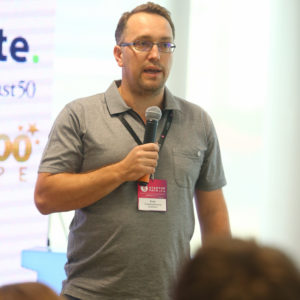
- I am the co-founder of an 11-year-old It company. We were two founders and now we are 200. We did innovation building for big companies. Our work was noticed by Deloitte and other actors on the market. I also like the fact that we were noticed on the Romanian market: we were last year’s ANIS’ best Romanian companies and this year we were included in the list of best Romanian companies by the Bucharest Stock Exchange.
- I started the company with my former schoolmate at Mihai Viteazu college in Bucharest. We shared a passion for math. In 2007, the year when Steve Jobs launched the first iPhone and that was also the time when a lot of opportunities started floating around.
- You shouldn’t be the best when opening a company, but you need to get there fast. At the time we didn’t understand the full dimension of what was lying ahead – and that was a big advantage.
- For five years we ran a profitable business. We started doing software for startups in Silicon Valley. But we were at that point inspired not to stay in a cozy position but try to learn from people who were better than us. When you run a business it can be difficult to realise you need to learn more.
- We then brought on board not Elon Musk, but we did manage to get Tom Chi. Robert Neivert is also a consultant and he is helping every year 50 startups to create a market for their products. Radu Cautis, a Romanian guy who left for the US and is well connected. It was a good decision to get these people on board.
- We then bought a Silicon Valley startup, Podium Launch. It was doing something we were missing in Qualitance. Mike Parsons, the guy who founded it, is now our Chief Technology Officer. We now use blockchain and AI to make products that are made for the future. Because companies need to invest for the future. We did things with Virgin in the UK and with IKEA in Europe and more.
- We are now teenagers and the question for me is: what have I learnt and what can I share with you? Solving problems. Usually, as a company want to go where the money is. But I think where we are right now is the time where technology is changing the world. We want to create something that has value. This is something that motivates all of us. I try to apply this learning/
- The second thing is – test and learn. I don’t believe too much in ideas but in what you find out through experiencing.
- The third thing is -care for your clients. Otherwise it will be a lose-lose situation. It’s never a matter of having good or bad clients. Sometimes you don’t work well together.
- Each business has its own DNA. But there are some behaviours that help. I am also a big believer in taking ownership, and responsibility. I am a huge fan of it and I am applying it.
Keynote Speaker | Anubhav Jain – Co-Founder | GoDoctor – All about raising funds. Learn from a serial entrepreneur who made it global
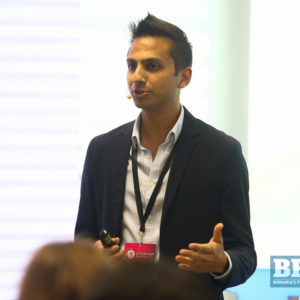
We came up with the idea of creating GoDoctor to unite the medical community.
“I’ve been of 476 planes so far, in more than 130 cities across the world. I have businesses on three continents in operation,” he said.
“I’ve raised about USD 10 million,” he added,
“In the early stage start-up you need to have a prototype and the business model validated. Your funding should be required for scale”
“I would try to stay away from venture capitalists or private equity at this stage,” he said recommending family offices and institutional investors for the early stage financing.
“On Series A you are looking for USD 1 million plus. They will ask you for financials and if you don’t have revenues they will turn away quickly. I would suggest looking at VC or PE fund that isn’t in the same space as you,” he explained adding that on Series A funding, the start-up might be accepted although it posts losses.
“We are seeing a lot of venture capitalists investing in early stage, even as low as USD 100,000,” he said on the funding trends in the US.
“Being authentic and genuine is really important,” he explained, adding that you need to demonstrate the idea as well.
“The medical community hasn’t been able to benefit from platforms because there is so much noise there,” he said, adding that a safe place is needed for the medical communities to collaborate.
“Our platform enables that communication,” said Jain.
He presented the rules of the “one pager” for entrepreneurs looking for funding.
“Keep it absolutely clear, to the point,”he explained.
“Demonstrate the opportunity and how you address the opportunity and bring it in”
“Thirdly, the most important thing is fabric. (…) You have to talk about your core team and how you will do what you have put on paper. Put it down as crystal clear as possible.
You also have to tell them how you are going to use the money.”
Some guidelines for the perfect pitch deck:
Brief&Vision
The problem you’re solving
Your product/solution
How you are going to make it happen
Competition and key differentiators
Team
Financial projections
Validation
Your ask & utilization
Sergiu Negut, VC, co-founder Fintech OS:
“The exit is the moment when you sell the business.”
The question is “are we on the verge of raising money, bringing investors.”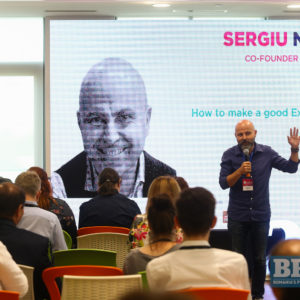
“The problem is that eventually you run out of money, especially if you want to accelerate the business. You have to start with the end in mind – what you want to have at the end of the day.” He said that an entrepreneur should also think who will buy the business.
“Entrepreneurs do not maximize profit, they maximize growth with a profit,” said Negut.
In my experience, entrepreneurs with a business of EUR 10 million turnover and EUR 1 million profit, they take USD 100,000 home.
“You have to think whose going to acquire the company from me,” said Negut. He said the opportunity is to build a company with the purpose of selling it.
“You have to start with the exit in mind and understand where each stage will take you,” said Negut.



:quality(80)/business-review.eu/wp-content/uploads/2024/06/br-june-2.jpg)



:quality(80)/business-review.eu/wp-content/uploads/2024/06/22C0420_006.jpg)

:quality(80)/business-review.eu/wp-content/uploads/2024/06/COVER-1-4.jpg)



:quality(50)/business-review.eu/wp-content/uploads/2024/06/br-cover-vtex.jpg)
:quality(50)/business-review.eu/wp-content/uploads/2024/05/returo-cover.jpg)
:quality(50)/business-review.eu/wp-content/uploads/2024/04/cover-april.jpg)
:quality(80)/business-review.eu/wp-content/uploads/2024/06/br-june-2.jpg)
:quality(50)/business-review.eu/wp-content/uploads/2024/07/VGP-Park-Timisoara_-8thbuilding_iulie-24.jpg)
:quality(50)/business-review.eu/wp-content/uploads/2024/07/America-House-Offices-Bucharest-Fortim-Trusted-Advisors.jpg)
:quality(50)/business-review.eu/wp-content/uploads/2024/07/BeFunky-collage-33-scaled.jpg)